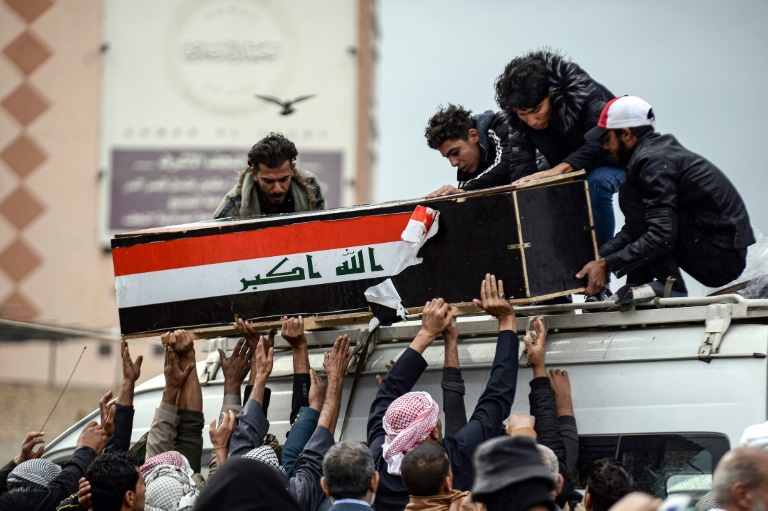Iraq’s protest-hit cities saw one of their bloodiest days yet on Thursday as a government crackdown killed more than 30 demonstrators following the dramatic torching of an Iranian consulate.
The country’s capital and south have been rocked by the worst street unrest since the 2003 US-led invasion that toppled Saddam Hussein, with a protest movement venting fury at the government and its backers in neighbouring Iran.
The Iraqi Human Rights Commission said more than 30 people had died on Thursday when security forces used “excessive force” to break up rallies, including 25 in the flashpoint city of Nasiriyah in the south.
Another two protesters were killed in Baghdad and four died in the Shiite shrine city of Najaf, where demonstrators had torched the Iranian consulate late Wednesday.
Crowds outraged at Tehran’s political influence in Iraq had stormed and burned down the mission, yelling “Victory to Iraq!” and “Iran out!”
 AFP /Iraqi demonstrators torch Iran’s consulate in the southern Iraqi Shiite holy city of Najaf late Wednesday
AFP /Iraqi demonstrators torch Iran’s consulate in the southern Iraqi Shiite holy city of Najaf late WednesdayIn response, Prime Minister Adel Abdel Mahdi early Thursday ordered military chiefs to deploy in several restive provinces to “impose security and restore order”, the army said.
But by the afternoon, following the deaths of almost two dozen protesters in the restive southern city of Nasiriyah, the premier had already sacked one commander, General Jamil Shummary.
As well as the deaths, the crackdown also saw more than 200 wounded as security forces cleared sit-ins with live fire, medics and security sources said.
Read Also: Cambridge College To Return Bronze Cockerel To Nigeria
Thursday’s violence brought the total death toll since early October to over 380, with more than 15,000 wounded, according to an AFP tally.
– ‘Bloodbath’ –
Medics in Nasiriyah said they had to carry out more than 80 life-saving surgeries in hospitals crowded with casualties.
Dhi Qar province, of which Nasiriyah is the capital, announced three days of mourning as thousands attended funeral processions there in defiance of a curfew announced earlier in the day.
 AFP / AHMAD AL-RUBAYEAnti-government demonstrations in Iraq have claimed nearly 370 lives since they first erupted in October
AFP / AHMAD AL-RUBAYEAnti-government demonstrations in Iraq have claimed nearly 370 lives since they first erupted in October“We’re staying until the regime falls and our demand are met!” they chanted.
Demonstrators, dispersed by security forces, regrouped at Nasiriyah’s main police station, setting it on fire.
They then surrounded its main military headquarters as armed members of the area’s powerful tribes deployed along main highways to block military reinforcements trying to reach the city.
“The scenes from Nasiriyah this morning more closely resemble a war zone than city streets and bridges,” said Lynn Maalouf of rights group Amnesty International.
“This bloodbath must stop now.”
The new phase of unrest in southern Iraq was unleashed after protesters late Wednesday stormed the Iranian consulate in Najaf, apparently evacuated by its staff.
An AFP correspondent saw them setting tyres and ablaze around the site, sending flames and thick smoke into the night sky.
Demonstrators have blamed powerful eastern neighbour Iran for propping up the Baghdad government which they are seeking to topple.
Tehran has demanded Iraq take decisive action against the protesters, with foreign ministry spokesman Abbas Mousavi condemning the consulate attack.
 AFP / Haidar HAMDANIIraq has been torn by the worst street unrest since the 2003 US-led invasion that toppled Saddam Hussein, as a protest movement has vented their fury at their government and its backers in neighbouring Iran
AFP / Haidar HAMDANIIraq has been torn by the worst street unrest since the 2003 US-led invasion that toppled Saddam Hussein, as a protest movement has vented their fury at their government and its backers in neighbouring Iran“Iran has officially communicated its disgust to the Iraq ambassador in Tehran,” he told Iran’s state news agency IRNA.
Later Thursday, three protesters were shot dead close to the burnt consulate, medics said.
AFP’s correspondent said clashes went on into the night between protesters and armed men in civilian clothes.
– Karbala clashes –
Iran’s consulate in Iraq’s other holy city of Karbala was targeted earlier this month, with security forces shooting four demonstrators dead.
The two countries have close but complex ties and Tehran holds significant sway among Iraqi political and military leaders.
Top Iranian commander Qasem Soleimani has held several meetings in Baghdad and Najaf to convince political factions to close ranks around Abdel Mahdi.
 AFP / Haidar HAMDANIIran voiced its ‘disgust’ over the burning of its consulate in the southern Iraqi holy city of Najaf
AFP / Haidar HAMDANIIran voiced its ‘disgust’ over the burning of its consulate in the southern Iraqi holy city of NajafThose meetings, sources told AFP, brought firebrand cleric Moqtada Sadr back into the fold after he called on Abdel Mahdi to resign.
But on Thursday, he reverted course, saying it would “be the beginning of the end for Iraq” if the government did not step down.
Sit-ins, road closures and street marches have shuttered public offices and schools for weeks in many southern cities.
On Thursday, clashes flared near Karbala’s provincial headquarters between some 200 protesters and riot police using tear gas and flash bangs.
Protesters kept up sit-ins in Kut, Amara and Hilla, all south of the capital, despite an increased security presence.
In the oil-rich port city of Basra, most government offices reopened but schools remained closed as security forces deployed in the streets.
Iraq is OPEC’s second-largest crude producer and the oil exported through Basra’s offshore terminals makes up more than 90 percent of the government’s budget.
Protesters have accused the ruling elite of embezzling state funds, desperately needed to restore failing public services and fix schools.
Corruption is rampant in Iraq, ranked the world’s 12th most graft-ridden country by Transparency International.
The World Bank says one in five Iraqis lives in poverty and youth unemployment stands at 25 percent.
AFP NEWS
